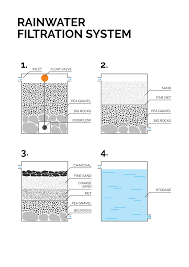The Importance of Rainwater Filtration
Rainwater filtration is a crucial process that helps improve the quality of water collected from rainfall. Whether you are harvesting rainwater for household use, irrigation, or other purposes, proper filtration ensures that the water is safe and free from contaminants.
One of the main benefits of rainwater filtration is the removal of impurities such as sediment, debris, and pollutants that may be present on rooftops or in collection systems. By filtering out these particles, you can prevent clogging in your storage tanks and ensure that the water remains clean and clear.
Additionally, rainwater filtration helps remove bacteria, viruses, and other pathogens that may be present in untreated rainwater. This is especially important if you plan to use harvested rainwater for drinking or cooking purposes. By using a combination of physical filters, UV sterilization, and other treatment methods, you can effectively purify rainwater for safe consumption.
Another advantage of rainwater filtration is the reduction of odors and unpleasant tastes that may be associated with untreated rainwater. Filtration systems can help improve the overall quality of harvested rainwater, making it more palatable for various uses.
Overall, investing in a proper rainwater filtration system is essential for ensuring the quality and safety of collected rainwater. By removing impurities, contaminants, and pathogens through effective filtration methods, you can maximize the benefits of rainwater harvesting while safeguarding your health and well-being.
6 Essential Tips for Effective Rainwater Filtration
- Use a fine mesh screen to filter out large debris from rainwater
- Install a first flush diverter to redirect the initial runoff which may contain contaminants
- Consider using a combination of sand, gravel, and activated charcoal as filtration media
- Regularly clean and maintain your filtration system to ensure optimal performance
- Ensure proper storage of filtered rainwater in clean containers or tanks
- Test the quality of filtered rainwater periodically for any contaminants
Use a fine mesh screen to filter out large debris from rainwater
Using a fine mesh screen to filter out large debris from rainwater is a simple yet effective tip that can significantly improve the quality of harvested rainwater. By placing a fine mesh screen over your rainwater collection system, such as gutters or downspouts, you can prevent leaves, twigs, insects, and other large particles from entering the storage tanks. This not only helps prevent clogging and contamination but also ensures that the rainwater remains clean and free from visible impurities. Incorporating this easy-to-implement filtration method is a practical way to enhance the overall efficiency and reliability of your rainwater harvesting system.
Install a first flush diverter to redirect the initial runoff which may contain contaminants
Installing a first flush diverter is a smart tip for rainwater filtration. This device helps redirect the initial runoff from the roof, which may contain contaminants such as dust, debris, and bird droppings. By diverting this first flush of water away from your collection system, you can prevent these pollutants from entering your rainwater storage tanks, ensuring that the water you harvest is cleaner and safer for various uses.
Consider using a combination of sand, gravel, and activated charcoal as filtration media
When setting up a rainwater filtration system, it is beneficial to consider using a combination of sand, gravel, and activated charcoal as filtration media. This multi-layered approach helps to remove different types of impurities and contaminants from the collected rainwater effectively. The coarse sand and gravel act as physical filters, trapping larger particles and sediment, while the activated charcoal adsorbs chemicals, odors, and organic compounds. By incorporating these diverse filtration media, you can enhance the quality of your harvested rainwater for various uses, ensuring a cleaner and safer water supply.
Regularly clean and maintain your filtration system to ensure optimal performance
Regularly cleaning and maintaining your rainwater filtration system is essential to ensure optimal performance and effectiveness. By keeping the filters clean and free from debris, sediment, and other contaminants, you can prevent clogs and maintain a steady flow of clean water. Regular maintenance also helps prolong the lifespan of your filtration system and ensures that it continues to remove impurities efficiently. By incorporating regular cleaning and maintenance into your routine, you can enjoy reliable and high-quality filtered rainwater for various uses.
Ensure proper storage of filtered rainwater in clean containers or tanks
Ensuring proper storage of filtered rainwater in clean containers or tanks is essential to maintain the quality and safety of harvested water. By storing filtered rainwater in containers that are free from contaminants, such as dirt, debris, or chemicals, you can prevent recontamination and preserve the purity of the water. Clean storage tanks also help prevent the growth of algae or bacteria that may compromise the quality of the collected rainwater. Proper maintenance and regular cleaning of storage containers are key to ensuring that the filtered rainwater remains safe for various uses, from irrigation to household chores.
Test the quality of filtered rainwater periodically for any contaminants
It is essential to periodically test the quality of filtered rainwater for any contaminants to ensure that the filtration system is effectively removing impurities and pathogens. Regular testing allows you to identify any potential issues and make adjustments to the filtration process as needed, ensuring that the collected rainwater remains safe for its intended use. By staying proactive and vigilant in monitoring the quality of filtered rainwater, you can maintain a reliable source of clean water for various purposes while prioritizing health and safety.

